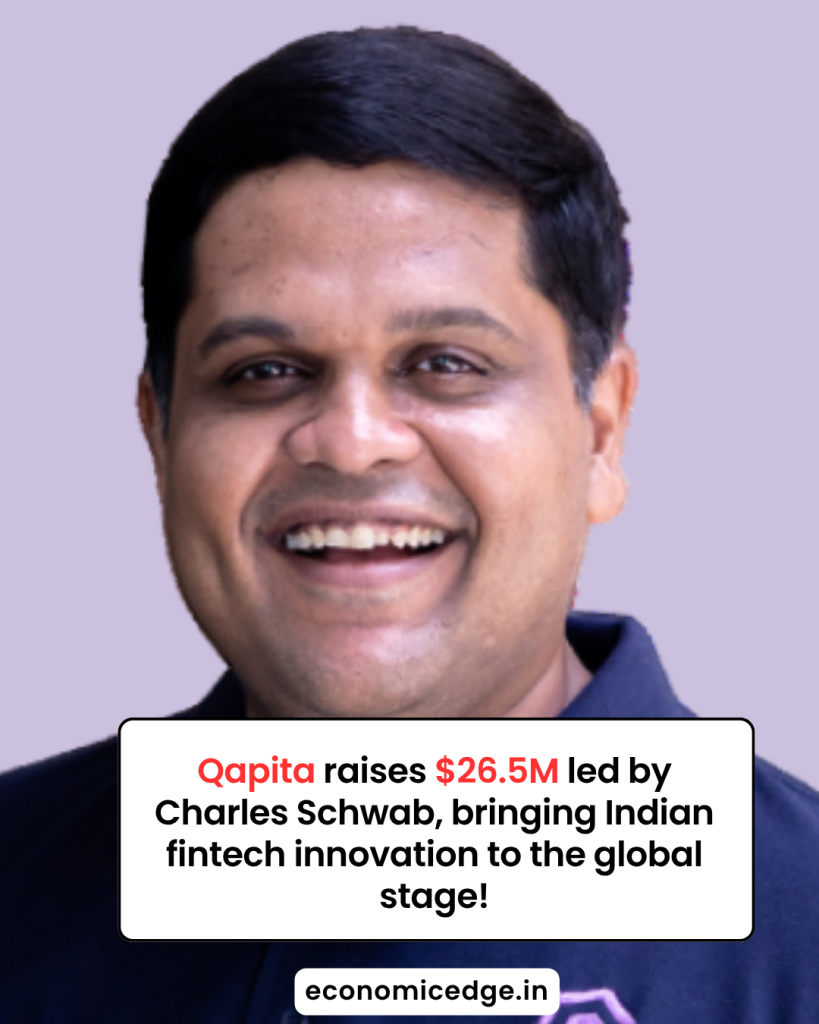
In a move that could redefine equity management for startups worldwide, Singapore-headquartered fintech Qapita has secured a robust $26.5 million in Series B funding, spearheaded by American brokerage behemoth Charles Schwab Corporation. This strategic infusion, announced yesterday, not only propels the India-origin platform deeper into the lucrative U.S. market but also cements a pivotal partnership aimed at challenging the dominance of established players like Carta. For Indian entrepreneurs eyeing global expansion, Qapita’s ascent signals a triumphant homecoming of sorts—proof that homegrown talent, nurtured in Bengaluru’s innovation hubs, can scale to Silicon Valley’s heights.
The funding round, which brings Qapita’s total capital raised to over $80 million, saw participation from existing backers Citi and MassMutual Ventures. It’s more than just financial firepower; it’s a calculated alliance. Charles Schwab, a Wall Street stalwart managing trillions in assets, has committed to a minority stake while collaborating on “Schwab Private Issuer Equity Services powered by Qapita”—a tailored platform designed to streamline cap table management, employee stock options, and seamless transitions to public listings for U.S. private firms. In an era where startups grapple with fragmented ownership tracking and regulatory mazes, this tie-up arrives as a beacon of efficiency, potentially unlocking smoother paths to IPOs and secondary share sales.
At its core, Qapita addresses a perennial headache for fast-scaling companies: the chaos of equity ownership. Founded in 2019 by Ravi Ravulaparthi, a former banker with stints at Citibank and Standard Chartered, alongside co-founders Lakshman Gupta (COO) and Vamsee Mohan (CTO), the platform was born from Ravulaparthi’s frustration with spreadsheet-driven cap tables during his banking days. “We saw companies drowning in manual errors and outdated tools,” Ravulaparthi told this correspondent in an exclusive interview. What started as a digital ledger for tracking stakes has evolved into a full-stack solution encompassing ESOP administration, fund reporting, and secondary transaction facilitation. Today, with 300 employees across offices in Singapore, Bengaluru, Jakarta, and now ramping up in the U.S., Qapita serves over 1,000 clients, including unicorns like Razorpay and Pine Labs in India, and emerging players in Southeast Asia.
This Series B marks a pivotal pivot toward the U.S., the world’s largest startup ecosystem. Qapita’s platform already powers equity workflows for American firms, but the Schwab partnership supercharges distribution. “Entering the U.S. with Charles Schwab’s backing isn’t just funding—it’s validation and velocity,” Gupta emphasized. The new joint service targets late-stage private companies, offering automated compliance, real-time valuations, and integration with public market tools—addressing pain points that have tripped up even giants like Uber in their pre-IPO phases. Proceeds will also fuel a fund administration module rollout across markets, enabling investors to handle portfolio tracking and investor reporting with AI-driven precision.
For India, Qapita’s trajectory is a source of quiet pride amid a fintech funding winter. The sector, once a darling of global VCs with $20 billion poured in 2021, has cooled to under $3 billion this year, per Tracxn data. Yet, Qapita—rooted in Bengaluru’s talent pool—bucks the trend, leveraging its dual-market expertise to bridge Asia and the West. Ravulaparthi, a Hyderabad native, credits India’s regulatory evolution, like the 2021 ESOP reforms under the Companies Act, for honing Qapita’s edge. “India’s startup boom forced us to build for complexity—now, that’s our exportable IP,” he said. The firm’s early $7 million seed from Endiya Partners and Nyca in 2021, followed by a $25 million Series A in 2022 led by Cercano, laid the groundwork. This year’s $10 million bridge from Analog Partners further greased the wheels for global leaps.
The Schwab angle adds strategic heft. As one of the first major U.S. financial institutions to back an Asian fintech for private market services, it underscores shifting tides. Schwab, which already administers stock plans for Fortune 500 publics, is eyeing the $100 billion private equity admin market, projected to grow 15% annually through 2030, according to McKinsey. “This collaboration bridges private innovation with public stability,” noted Schwab’s head of advisor services in a statement, highlighting how Qapita’s tech will integrate with Schwab’s ecosystem for end-to-end equity lifecycle management. It’s a masterstroke against incumbents: Carta, valued at $7.4 billion, has faced backlash over secondary trading fees and data privacy lapses, creating openings for agile challengers like Qapita and Pulley. In India, where Carta briefly entered before retreating in 2023, Qapita has solidified as the go-to, powering 40% of ESOP issuances for Series A+ firms, per internal estimates.
Yet, this expansion isn’t without hurdles. The U.S. market demands rigorous SEC compliance and data sovereignty, challenges Qapita is tackling with localized servers and blockchain-secured ledgers. Competition intensifies too—Morgan Stanley’s Shareworks and Fidelity’s offerings loom large. “We’re not just competing on features; we’re betting on trust,” Mohan, the CTO, remarked, pointing to Qapita’s ISO 27001 certification and zero-downtime record. Globally, economic headwinds like rising interest rates could slow startup funding, crimping demand for equity tools. Still, Qapita’s focus on secondary liquidity—facilitating early exits for employees—positions it well in a talent-retention crunch.
From an Indian lens, Qapita exemplifies the “reverse export” model: solutions forged in domestic fires, refined abroad. Bengaluru, its de facto R&D hub, employs 150 engineers innovating on AI for predictive vesting and scenario modeling. This funding could spur job creation, with plans to double U.S. headcount to 50 by mid-2026. It also spotlights Singapore’s role as a fintech springboard for Indian founders, offering tax perks and proximity to ASEAN markets. “Qapita isn’t just a company; it’s a blueprint for how Indian tech can own the equity stack globally,” said Amit Gupta, founder of PlacementEdge, a Qapita client and early investor.
Broader implications ripple through India’s startup ecosystem. As unicorns like Byju’s and Paytm navigate post-IPO equity complexities, platforms like Qapita democratize access to sophisticated tools once reserved for elites. The Schwab tie-up could accelerate cross-border ESOPs, vital for India’s 1.2 million startups competing for global talent. Critics, however, caution against over-reliance on U.S. partners amid geopolitical flux. “While empowering, such alliances must safeguard data sovereignty,” opined fintech analyst Reena Aggarwal of IIT Delhi.
Ravulaparthi remains bullish. “Entrepreneurship fuels economies, and equitable ownership unlocks that potential. With Schwab, we’re not just managing equity—we’re multiplying it.” As Qapita eyes a $500 million valuation post-money, this round feels like ignition for a rocket built in India, fueled by American capital. In a world where startups chase unicorns, Qapita is quietly building the stables—secure, scalable, and now, unstoppable.
also read: Golconda Fort: A Historical Gem Facing Modern Challenges
Last Updated on: Thursday, October 9, 2025 4:28 pm by Economic Edge Team | Published by: Economic Edge Team on Thursday, October 9, 2025 4:28 pm | News Categories: Funding News


Leave a Reply